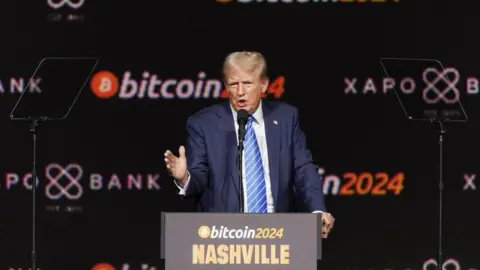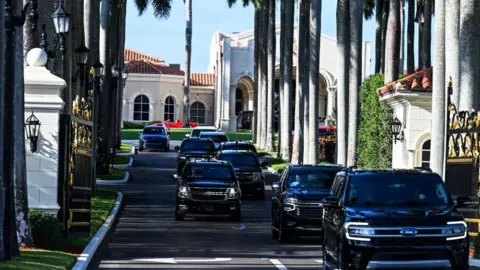

Shortly after publicly purchasing and consuming a $6.2 million banana in an art-world stunt, Chinese crypto entrepreneur Justin Sun made another eye-catching purchase , investing $30 million ($23.5 million) in a cryptocurrency company called World Liberty Financial.
The company had foundered since its launch in October, with investors appearing wary of its prospects and terms.
But it had one potentially attractive feature: the ability to do business with a company partnered and promoted by none other than Donald Trump.
Mr. Sun’s investment tipped the company past the threshold that allowed the president-elect to begin profiting from the company. Trump and his family are now able to raise about $20 million — and potentially much more.
Mr. Sun, who is currently battling fraud charges in the United States related to his own crypto business, did not respond to questions about what motivated his interest in the tokens, which cannot be traded.
But the episode has raised alarms among government ethics experts, who see it as an indication that the expansion of Trump’s business ventures has made it easier than ever for those who hope to influence American politics to direct money towards him.
“Conflicts increased dramatically with the extent of his business empire,” said Richard Painter, who served as chief White House ethics counsel during the George W. Bush administration.


In a statement to the BBC, Trump’s team dismissed their concerns.
During his first term, “President Trump walked away from his multibillion-dollar real estate empire to run for office and gave up his government salary,” said Trump spokeswoman Karoline Leavitt.
“Unlike most politicians, President Trump did not enter politics for profit: he fights because he loves the people of this country and wants to make America great again.”
But Trump has taken little action in response to concerns about the potential for corruption, or its appearance, as he prepares for his return to the White House.
New opportunities
Trump has previously faced questions about conflicts of interest.
During his first term as president, the Trump International Hotel in Washington, D.C. became a symbol of this problem, as a favorite place for lobbyists, foreign diplomats and their allies to stay and spend.
Critics argued that the hotel allowed Trump to indirectly profit from his position. He faced accusations and lawsuits alleging he violated the U.S. Constitution’s ban on presidents receiving foreign emoluments — or profiting from their office.
But experts say the growth of his business empire, which now includes a publicly traded social media company, a cryptocurrency company and ties to a Saudi-backed golf league, makes it easy for anyone hoping to attract the favors of moving money more discreetly and smoothly. much larger sums.
“The scale and ease have increased,” said Michael Ohlrogge, a law professor at New York University who has studied Trump Media, which runs Truth Social and now accounts for the bulk of the $6 billion fortune. of Trump. “You can only reserve a limited number of hotel rooms.”
On Truth Social, for example, Professor Ohlrogge said a foreign government or company could buy ads to convince investors that the company was gaining ground, causing its stock price to rise.
Although Trump Media has a market value of more than $7 billion, there have been few signs of such activity so far. The company reported less than $5 million in ad sales this year.
But given the “amplifying” effect of the stock market, Professor Ohlrogge said it would not take much spending to lead to potentially significant gains for Trump, who owns more than half of the company’s shares.
“His pro-crypto position”
Nowhere is the entanglement between Trump’s business interests and his public duties more evident than in the crypto sector, where he has deepened his personal involvement, while promising to defend it during his tenure in the White House.
His plans include a rollback of regulation and ideas such as a national Bitcoin reserve, in which the government would store the cryptocurrency.
“One of the most important issues to be determined over the next couple of years is how crypto is regulated,” said Virginia Canter, chief ethics adviser at Citizens for Responsibility and Ethics, a non-governmental organization. partisan in Washington. “Well, now he’s an active player in the crypto market. How could this be regulated (could) affect his personal wealth, what kind of position he takes.”
Nik Bhatia, founder of Bitcoin Layer, a company that advocates investments in Bitcoin, said it would be a mistake to dismiss Trump’s stance on crypto as driven solely by his own financial interests.
“I don’t see these movements driven by self-interest – I see them representing the electorate,” he said.
But he still said: “I think there is probably a conflict of interest in that his pro-crypto stance will benefit his company. »


This week, Trump announced that he would nominate Paul Atkins, who has lobbied for the industry, to head the Securities and Exchange Commission (SEC).
He is widely expected to scale back enforcement efforts at the agency, which monitors publicly traded companies such as Trump Media for issues including fraud and insider trading . The SEC has overseen a crackdown on the crypto industry under President Joe Biden.
Mr. Sun, the World Liberty Financial investor, was caught up in the SEC crackdown last year, after the agency accused him and his firm of failing to properly register with government during the sale of certain digital assets, among other accusations.
Under new leadership, the agency could very well drop the case, said John Coffee, a Columbia Law School professor and securities law expert.
“The main characteristic of Mr. Atkins is that he dislikes law enforcement and wants to significantly restrict the range of cases that the SEC will be able to bring,” he said.
In announcing his investment last month, Mr Sun did not mention the SEC complaint – which he said lacks merit – but cited Trump’s views on crypto.
“The United States is becoming the blockchain hub, and Bitcoin owes it to @realDonaldTrump!” he wrote on X. “TRON is committed to making America great again and being at the forefront of innovation. Let’s do it!”
Fewer guardrails
There is little in American law that sets limits on conflicts of interest: Presidents are not bound by the same rules that govern other government employees and cabinet members.
Although the U.S. Constitution theoretically prohibits presidents from accepting gifts from foreign governments while in office, the Supreme Court has already dismissed two prior lawsuits from Trump’s first term involving potential conflicts of interest.
Last summer, in a case involving Trump, she also ruled that presidents have broad immunity from criminal prosecution while in office.
In the past, Trump has argued that his business was actually hurt by his time in the White House, as his controversy-worried partners severed ties and he faced investigations and lawsuits.
As he prepares to enter the White House for a second time, Trump has yet to reveal his ethics plan, as is customary, and has given no sign that he plans to comply to such concerns.
He has pledged to maintain his stake in Trump Media, continues to sell Trump-branded products and lend his name to companies like World Liberty Financial. His Mar-a-Lago club remains a place where the wealthy willing to pay for membership can gain access to the president with little or no transparency.
Ethics experts fear that Trump has opened a door that will be difficult to close.
“Trump sent the message: he can do whatever he wants, because he won,” Mr. Painter said. “Future presidents will look at this and think: “We can do what we want.'”



